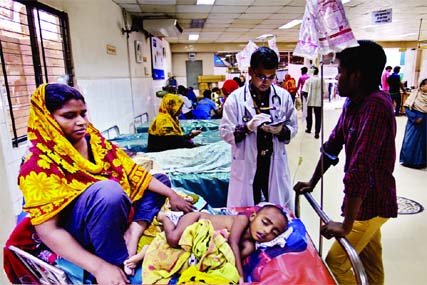
Staff Reporter :
A scorching heat wave gripped the capital city Dhaka and hundreds of patients with diarrhoea, kidney and stomach-related problems have been brought to different city hospitals in the last couple of days.
The city sizzled for the last 48 hours with maximum temperature touching 36.4°C mark. The weather experts forecasted the dry spell to continue in most parts of the country including the capital in the coming days with a little chance of rain in the next week. Met office said, mild to moderate heat wave is sweeping over Khulna division and the regions of Rajshahi, Dhaka, Madaripur, Barisal and Patuakhali, and it may spread over the rest part of Dhaka & Rajshahi divisions. Day and night temperature may rise slightly over the country. The country witnessed highest temperature 37.5 °C in Khulna yesterday, the Met office forecast also said.
Meanwhile, about 2000 patients with heat-related diseases like diarrhoea, cholera and food poisoning visited the city hospitals including Dhaka Medical College and Hospital and International Centre for Diarrhoeal Disease Research, Bangladesh [ICDDR,B].
Many of the children admitted in the wards had fallen ill after drinking contaminated water or taking unhygienic food.
Senior staffers at the hospitals said that 70 to 80 per cent of their patients were hit by the scorching heat. “Sometimes we have to admit more patients than our capacity. Motions, dehydration, diarrhoea and vomiting are the main problems,” they said.
A senior doctor at the ICCDR, B said that 40 per cent of the minor patients visiting the hospital were suffering from diarrhoea and viral infection. “Children and aged people and those who ate unhygienic food from vendors could easily fall a victim to the stomach-related problems in the summer,” he said. Doctors urged the masses to take precautionary measures against the harsh effects of the rising heat, which according to Met officials, would continue in the coming weeks.
They advised the public to avoid direct exposure to the sunlight and cover the head and neck areas besides ensuring a maximum intake of water and other liquids such as salted lassi to prevent dehydration due to excessive sweating.
They also asked the farmers, labourers and other such people who work outside to start and complete their work as early as possible in the morning, before the sun gets harsh.

